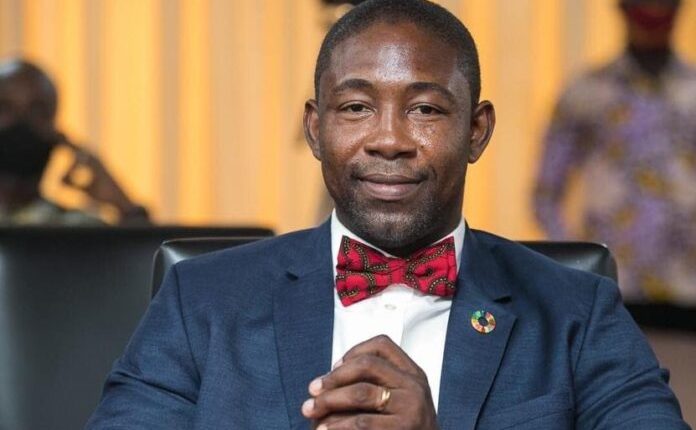The Health Insurance Authority (NHIA) has announced that by the end of 2023, mental health treatment will be enlisted as part of the conditions covered by the Authority.
Chief Executive Officer of the Authority, Dr. Bernard Oko Boye said mental health issues like depression among others will be catered for by the state.
Addressing journalists in Accra, Dr. Okoe Boye says the NHIA is here to help persons with mental health issues.
“Before the end of this year, the National Health Insurance Authority is for the first time going to pay for mental health conditions, at least the topmost conditions that are seen daily in our hospitals will be covered by the Authority, and we are currently working on the details as to the cost, the code and other such things.”
Meanwhile in a spate of 42 days (24th May – 7th July 2023), the NHIA has paid its credentialed healthcare providers over GH¢471 Million Cedis to cover claims submitted for periods up to January 2023.
For the first time in several years, the NHIS is back into the accepted 90-day arrears window which means that health providers are only owed two (2) months of claims for February and March 2023.
Membership & Health Providers
As of the end of 2022, the NHIS Scheme had an active membership of 17.2 million, representing approximately 55 percent of the population which is the highest since the inception of the Scheme.
The National Health Insurance Authority (NHIA) has credentialed over 4,500 health facilities across the country comprising Public, Private, Quasi, and Faith-based facilities with a variety of levels as CHPS Compounds, Health Centres, Pharmacies, Diagnostic Centres, Primary Hospitals, Secondary and Tertiary with the very latest being the International Maritime Hospital (GH) LTD (IMaH) in Tema Community One.
The public’s reliance on the use of the NHIS membership card to seek healthcare is still very encouraging across the country. A random sampling conducted to ascertain the use of the NHIS card in some regions of Ghana revealed the outcomes in the diagram above. It is evident that on average over 80% of attendees to most public healthcare centers attend with their NHIS membership cards with at least three different drugs dispensed per visit. This cannot be said of a Scheme that is failing and accused of only dispensing paracetamol despite the rise in claims payments.
NHIS and Ghana Cards linkage
Championing the national agenda of ‘One nation, one card for accessing healthcare services’ the NHIA in partnership with the National Identification Authority (NIA) intensified campaigns making it possible for people to use the Ghana card to access healthcare services effective May 01, 2021.
NHIS Benefit Package Expansion
With the aim of increasing the survival rate of children suffering from childhood cancers, the NHIS Benefit Package was expanded and made provision for the four main childhood cancers which are Neuroblastoma (childhood cancer of the jaw and abdomen), Leukemia (childhood cancer of the blood), Retinoblastoma (childhood cancer of the eye) and Wilms Tumor (childhood cancer of the kidney). Family Planning services were also added to the Benefit Package, after a successful pilot of the project in some selected districts nationwide in July 2022.
NHIS Reviews Tariffs Upwards
On July 1, 2022, the NHIS tariffs paid to health providers were adjusted upwards by 30% after consultation with critical stakeholders in the health sector. Within a space of seven months, the NHIA again in February 2023 increased upwardly its tariffs for medicines and services covered by the Scheme by a whopping 50% for medicines in the framework contracting plus an additional 30% marginal increase.
Non-framework medicines were reviewed upwards by 20% while service tariffs across board have increased by 10%. These adjustments were necessitated to correspond to the increasing prices of most active pharmaceutical ingredients and Management’s desire to minimize the incidents of illegal charges made of NHIS members by healthcare facilities. A recent study conducted by the NHIA revealed that since the adjustments, OPD bills to the Scheme have gone up by over 300 percent.
National Committees Set Up to Curb Illegal Payments
Copayments refer to the direct out-of-pocket payments for healthcare services and medications covered under the NHIS Benefit Package, and that adversely affect affordability and equality in accessing healthcare. In an attempt to eliminate these financial barriers confronting the NHIS, Management set up decentralized Co-payment Committees at the Head Office, Regional and District offices with mandates that include engaging with the NHIA’s credentialed healthcare service providers and NHIS members who are sometimes compelled to pay such extra monies for services covered by the Scheme.
This is to strengthen the NHIA’s mandate of providing financial risk protection and improved access to healthcare for its members. The NHIA Board is currently reviewing the first national report submitted and will provide guidance on the appropriate sanctions to apply to facilities that will be found culpable. This age-old phenomenon has weakened some confidence in the Scheme and must stop.
Free Elderly Healthcare
Backed by the Ministry of Health, the NHIA Governing Board introduced the ‘Free Elderly Care Policy’ in December 2022. The policy guarantees a waiver of the mandatory 30-day waiting period and an exemption from the payment of premium and processing fees for all members aged 70 years and above.
President Nana Addo Dankwa Akufo-Addo approved the instant healthcare policy, embedded in the NHIS to address the many underlying health-related challenges faced by the older population in Ghana. This development gave greater priority to covering the healthcare needs of vulnerable groups in Ghana, especially those within the age bracket of 70 and above.


Comments are closed.